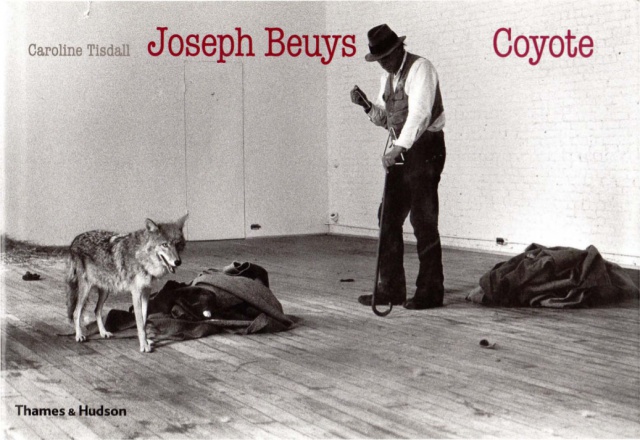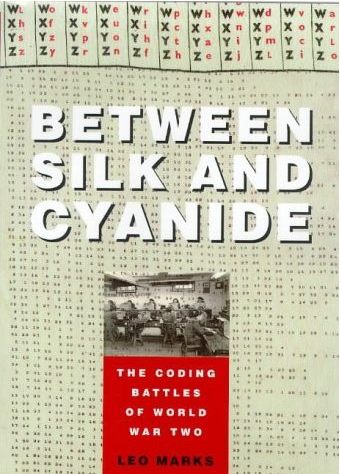Caroline Tisdall: Joseph Beuys: Coyote (1976–)
Filed under artist publishing | Tags: · art, performance art, photography

“Coyote was the first attempt to capture a performance by Joseph Beuys in book form. Beuys’s Action, I Like America and America Likes Me, took place in May 1974, when he spent seven days and nights in a room with a wild coyote.
The artist’s activities during his confinement with the coyote followed a repeated pattern. He employed a number of objects: felt, a walking stick, gloves, a flashlight and the Wall Street Journal – fifty copies were delivered daily. Over the period of a week, man and beast developed a mode of wordless co-existence, a two-sided performance that became rich with assumed meanings. Caroline Tisdall, a longstanding friend of the artist, who has written extensively on Beuys and has directed films about him, took most of the photographs and wrote the accompanying text.”
First published by Schirmer/Mosel, Munich, 1976
Publisher Thames & Hudson, London, 2008
ISBN 9780500543689
160 pages
via Scribd
Commentary: Jan Verwoert (e-flux, 2008).
PDF (226 MB, updated on 2019-11-23)
Comments (4)Libre Graphics magazine 2(2): Gendering F/LOSS (2014)
Filed under magazine | Tags: · floss, free culture, free software, gender, graphic design, libre graphics, software

The current issue of Libre Graphics engages with discussions around representation and gendered work in Free/Libre Open Source Software and Free Culture.
Why Gendering F/LOSS? In the world of F/LOSS, and in the larger world of technology, debate rages over the under-representation of women and the frat house attitude occasionally adopted by developers. The conventional family lives of female tech executives are held up as positive examples of progress in the battle for gender equity. Conversely, pop-cultural representations of male developers are evolving, from socially awkward, pocket-protectored nerds to cosmopolitan geek chic. Both images mask the diversity of styles and gender presentations found in the world of F/LOSS and the larger tech ecology. Those images also mask important discussions about bigger issues: is it okay to construct such a strict dichotomy between “man” and “woman” as concepts; how much is our work still divided along traditional gender lines; is it actually enough to get more women involved in F/LOSS generally, or do we need to push for specific kinds of involvement; do we stop at women, or do we push for a more inclusive understanding of representation?
This issue looks at some of the thornier aspects of gender in F/LOSS art and design. In discussing gendered work, the push for greater and greater inclusion in our communities, and representations of gender in our artistic practices, among others, we hope to add and amplify voices in the discussion.
Edited by Ana Isabel Carvalho, ginger coons and Ricardo Lafuente
Publisher ginger coons, January 2014
Creative Commons Attribution-Share Alike license
ISSN 1925-1416
56 pages
PDF (31 MB, low-res version for screen)
PDF (360 MB, high-res version for print)
Leo Marks: Between Silk and Cyanide (1998)
Filed under book | Tags: · 1940s, biography, cryptography, memoir, poetry, war

Background image on the cover is a ‘Worked Out Key’ (WOK) printed on silk; photograph shows FANY radio operators receiving morse code transmissions from secret agents.
“In 1942, Leo Marks left his father’s famous bookshop, 84 Charing Cross Road, and went off to fight the war. He was twenty-two. Soon recognized as a cryptographer of genius, he became head of communications at the Special Operations Executive (SOE), where he revolutionized the codemaking techniques of the Allies and trained some of the most famous agents dropped into occupied Europe, including “the White Rabbit” and Violette Szabo. As a top codemaker, Marks had a unique perspective on one of the most fascinating and little-known aspects of the Second World War.
Writing with the narrative flair and vivid characterization of his screenplays, Marks gives free rein to his keen sense of the absurd and his wry wit, resulting in a thrilling and poignant memoir that celebrates individual courage and endeavor, without losing sight of the human cost and horror of war.
In an interview with Channel Four included in the DVD of the film Peeping Tom, Marks quoted General Eisenhower as saying that his group’s work shortened the war by three months, saving countless lives.”
Publisher Free Press, New York, 1998
ISBN 0743200896
416 pages

